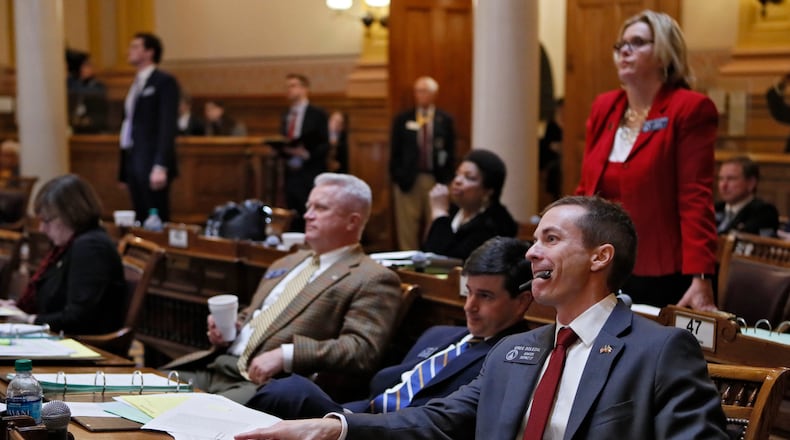A proposal to use taxpayer money to send students to private schools failed in a close vote in the Georgia Senate on Tuesday, despite the backing of some top GOP state leaders.
Senate Bill 173 was expected to eventually cost as much as half a billion dollars annually, which factored into the criticism leveled by Democrats.
Republicans said parents should be free to choose how to educate their kids, saying “doom and gloom” predictions about harm to public schools from similar programs approved years ago had not been borne out.
The bill sought to establish “scholarship” accounts through which parents could direct the $5,500 on average in state money now going to their child’s public school to a private school instead, or to other educational costs, including textbooks, tutoring or even therapy. But parents would have had to commit to educating their children outside the public system, whether at home or in a tuition-based school.
Such use of public dollars, historically referred to as private school “vouchers,” has caused a polarizing national debate between those who say parents deserve publicly financed alternatives to the school near their home and those who say these programs harm public schools.
The legislation could get another vote Thursday, the last opportunity to cross bills from one General Assembly chamber to the other.
Sen. Renee Unterman, R-Buford, who supports the bill, said she will ask for reconsideration. To her, it would give parents in "failing" schools a "sliver of hope." But opponents of the bill say poor kids can't afford transportation to a private school, let alone private school tuition, even if it's subsidized.
Critics, especially teachers, say diverting money to private schools weakens public schools by starving them of cash and skimming their most able students.
An analysis of a similar House bill by the state auditor's office found the program would require $48 million of tax dollars in its first year, rising to a maximum of about $543 million in a decade as more students participate.
Backers see it as a free market approach to education.
Sen. Greg Dolezal, R-Cumming, characterized his bill as "students first" legislation that lets parents choose a form of private education, including home schooling. He noted that 75 percent of Republican voters were in favor of a 2016 primary ballot question about letting parents choose how to use tax dollars to educate their children. Polls on such policies typically show more support among Republicans than among Democrats.
Georgia already has a private school funding program, but in that one taxpayers "contribute" money to designated private schools through nonprofit organizations and get their money back in a state tax credit. The only such program with direct state funding is restricted to students with disabilities.
Democrats said parents are already free to choose a private school, they just have to pay for it without the help of taxpayers, adding that the subsidy would be too little for most to cover private tuition, particularly those in “inner-city” neighborhoods.
Sen. Freddie Powell Sims, who is black, suggested the worst possible motives, asking in a rhetorical exchange with Sen. Steve Henson, D-Stone Mountain, the minority leader, if the bill intended “sameness,” letting kids attend school with kids who “look like” them.
“Do you think it’s about the resegregation of educational institutions in the state of Georgia?” Sims, D-Dawson, asked.
Henson, who is white and voted against the bill, said that was a possible outcome but “hopefully not an intended consequence.”
Two hours after the debate started, Democrats voted in a bloc against the bill. They were joined by seven Republicans. When factoring in three GOP senators who didn’t vote, the bill failed 25-28.
The defeat came despite the backing of Gov. Brian Kemp and another powerful Republican, Lt. Gov. Geoff Duncan, the Senate president. Duncan said through a spokesman that he was disappointed with the outcome, and vowed to continue looking "for ways to give parents options beyond the status quo."
The public school lobby had been working overtime against the bill and had expected it to pass.
“Pleasantly surprised,” was the reaction of Craig Harper, executive director of the 90,000-plus-member Professional Association of Georgia Educators.
Former Democratic Sen. Vincent Fort, now a lobbyist for the Georgia Federation of Teachers, said senators on both sides of the aisle feared the “massive cost” of the proposal and the speed with which it was rushed through the Senate. It was introduced less than two weeks ago.
“If you’re going to commit hundreds of millions of dollars,” Fort said, “you want to vet it thoroughly, right?”
About the Author
Keep Reading
The Latest
Featured


